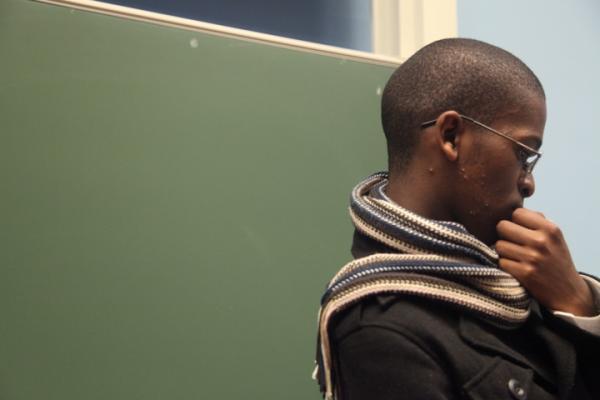Letter from a learner

My name is Bayanda Mazwi and I am 17 years old. I am currently doing grade 11 at the Centre of Science and Technology (COSAT) in Khayelitsha. I live with my parents and my two younger siblings in the informal settlement of Monwabisi Park in Khayelitsha.
COSAT is a township high school with a difference. We have 507 learners in grades 8 to 12 and all learners take Science and Maths from grade 10. There is no Maths Literacy at COSAT. Last year and the year before our school had a 100% Matric pass rate, with a 98% pass rate in Maths and Science last year.
At COSAT our teachers are very dedicated. They are always on time, and spend their time in the classroom teaching us and making sure we get the best education. Teachers also run extra-mural activities for learners.
We spend the last hour of every day studying and doing our homework, with the assistance of our teachers. School ends at 4:15pm.
On average there are between 25 and 30 students per class. We have two science laboratories, two computer centres and a fully-stocked and functioning library with a full-time librarian.
The librarian works for SERI, an NGO which raises funds for COSAT and helps with recruiting new Grade 8s and getting them ready to start at COSAT. In order to get accepted to COSAT, Grade 7s have to write Maths, Science and Language tests. Only the students who do well get to come to COSAT.
I know that the quality of education that I am receiving is much better than the quality of education other children like me from disadvantaged areas and poor and working-class families are receiving. My primary school and my first two years of high school in Khayelitsha were very different to COSAT.
At my primary school, we didn’t have enough desks and chairs. This meant that we had to sometimes sit on the floor or write on our laps. We also had many broken doors and windows, and in winter many of us became sick. We also didn’t have a library. This meant that I struggled to learn to read and speak English.
But my teachers were very caring and loving. They were patient and played with us and made sure that we were safe at school. I was also lucky that my aunt, who was a pre-school caregiver and who I used to stay with after school, read English books to me and taught me how to read before she died.
My first high school also had infrastructure problems. The toilets were broken and dirty, and we didn’t have enough desks and chairs. There was no library, and learners were not allowed to use the laboratory and computer centre. There were not enough textbooks – we usually shared these, three per book – and classes were overcrowded.
But unlike my primary school, there were also serious problems with the behavior and the attitude of the learners, the teachers and the principal. Many learners and teachers came late to school and unprepared. Learners would bunk classes and stay absent without any good reason.
Some of the teachers spent little time teaching. Either they would sit in the staffroom or be in the classroom and not teach. There was little respect between teachers and learners, and sometimes there were physical fights between them. The school was not a safe place. Many of the boys carried knives and some of them smoked dagga at school.
Most schools in Khayelitsha are like my primary school and my first high school. They are not like COSAT. They don’t have the resources, and the teachers don’t have the support and training that they need. It should not be like this. All poor and working class children deserve a quality education – not just the lucky few like me. We all have a responsibility to make this a reality.
This is why I am a member of Equal Education. EE organizes learners across the country – even in deep rural areas – to campaign for better infrastructure, greater access to textbooks and more accountability from teachers and government. We have also run campaigns against late coming and supported students illegally expelled from their schools because of their culture or pregnancy.
For the past three years, we have been campaigning for minimum norms and standards for school infrastructure. Once Minister Angie Motshekga adopts these norms and standards, which she must do by 30 November this year, government will have to provide water and electricity, proper toilets and decent classrooms to all poor schools, in a reasonable period of time. And after that, sports fields and facilities, libraries, laboratories and computer centres.
I am going to be a part of making sure that this happens, and that government delivers on its promises. Join me in the struggle for quality education for all.
Bayanda Mazwi is the Deputy Chairperson of Equal Education

This article is licensed under a Creative Commons Attribution-NoDerivatives 4.0 International License.


